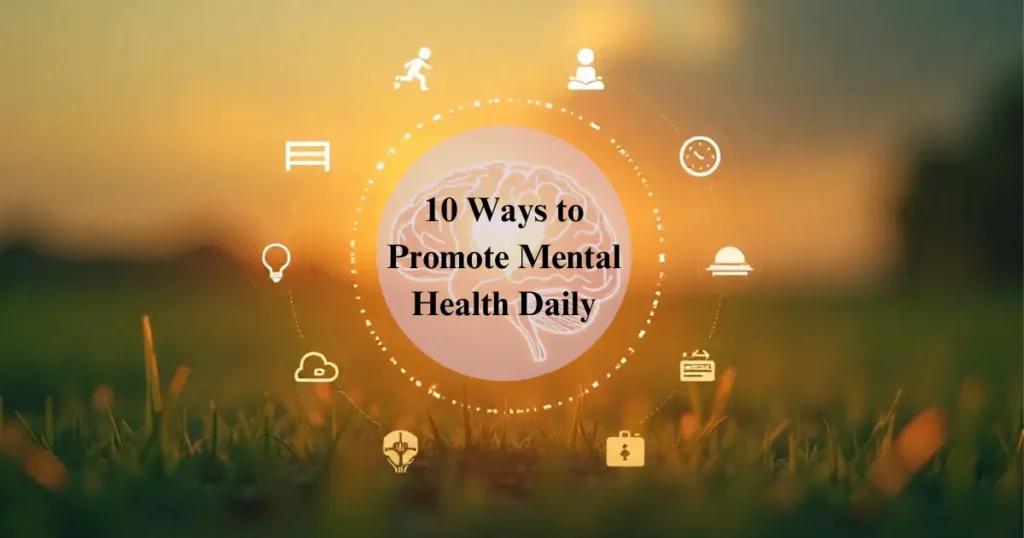Maintaining good mental health isn’t just something we should think about when we are feeling overwhelmed. It’s a daily practice, a lifelong commitment to caring for our emotional and psychological well-being. If you are looking for practical, science-backed ways to feel better, boost your mood, and build resilience, you are in the right place. In this guide, we will explore 10 ways to promote mental health daily, helping you cultivate lasting balance and peace of mind.

Why Focus on Mental Health?
Before we explore the specific techniques, it’s important to understand why mental health deserves your daily attention. The World Health Organization (WHO) defines mental health as “a state of well-being in which an individual realizes their abilities, can cope with the normal stresses of life, and can work productively.”
Poor mental health can lead to chronic stress, physical health problems, and even emotional burnout. But the good news? Research shows that everyday lifestyle choices and routines play a huge role in protecting and improving mental well-being. By following 10 ways to promote mental health in your daily life, you are not only enhancing your mood, but you’re also strengthening your resilience, focus, and overall life satisfaction.
1. Prioritize Sleep as Your Daily Foundation
Sleep is essential for emotional regulation, memory consolidation, and cognitive clarity. When you consistently miss out on sleep, your risk of anxiety and depression skyrockets. According to the National Sleep Foundation, adults need between 7 and 9 hours of restful sleep to function at their best.
Prioritizing sleep means establishing a bedtime routine that helps you unwind. Start by limiting screen time an hour before bed, reducing caffeine intake in the afternoon, and creating a comfortable, dark, and cool sleeping environment. Over time, good sleep hygiene becomes one of the easiest ways to improve mental health daily.
Scientific Insight: A 2021 study published in Nature Reviews Neuroscience found that chronic sleep deprivation alters emotional processing in the brain, making it harder to manage stress and regulate mood.
2. Move Your Body Every Day
Exercise isn’t just about physical health—it has profound effects on your mental well-being. Physical movement triggers the release of endorphins, which are natural chemicals that boost your mood. It also helps lower cortisol, the body’s primary stress hormone.
Daily movement can include jogging, yoga, dancing, or even a 20-minute brisk walk. Find activities you enjoy so that they become part of your lifestyle, not just a chore.
Scientific Insight: Research from Harvard Medical School confirms that regular exercise reduces symptoms of anxiety and depression, and just 30 minutes of moderate activity five times a week can significantly improve your mood.
3. Connect with Others Regularly
Humans thrive on connection. Feeling isolated can negatively impact our mental health. Prioritizing relationships with friends, family, or community members helps buffer against stress and provides a sense of belonging.
Consider scheduling regular check-ins with loved ones, joining a local club, or volunteering. These small actions nurture meaningful connections, which are key components of mental wellness activities.
Scientific Insight: A study from the American Journal of Psychiatry found that people with strong social ties have a 50% increased likelihood of longevity and reduced mental health issues compared to those who are socially isolated.
4. Practice Mindfulness and Stress Reduction
Mindfulness encourages us to stay present without judgment. It’s an incredibly effective strategy for managing anxiety, depression, and everyday stress.
You can practice mindfulness through meditation, deep breathing, or mindful eating. Begin with just five minutes a day and gradually increase over time. Over time, mindfulness retrains your brain to pause before reacting, reducing emotional overwhelm.
Scientific Insight: A 2016 meta-analysis in Biological Psychiatry showed that mindfulness-based practices significantly reduce symptoms of anxiety and depression, thanks to structural brain changes in areas responsible for emotion regulation.
5. Set Boundaries for Your Mental Space
Without healthy boundaries, burnout is inevitable. Boundaries protect your mental energy, helping you prioritize what truly matters and say no to what doesn’t serve you.
Learn to recognize your limits. This might mean setting work-hour boundaries, protecting downtime, or limiting contact with toxic individuals. By establishing these clear guidelines, you prevent emotional overload and maintain mental clarity.
Scientific Insight: A 2020 report in Occupational Medicine found that employees who enforce work-life boundaries experience less burnout and higher psychological well-being.
6. Nourish Your Body with Brain-Boosting Foods
Food serves as fuel not only for your body but also for your brain. Diets rich in omega-3 fatty acids, antioxidants, fiber, and vitamins support cognitive function and emotional balance.
Incorporate brain-boosting foods like salmon, walnuts, blueberries, leafy greens, and legumes into your meals. These support neurotransmitter production and reduce inflammation, which is often linked to mood disorders.
Scientific Insight: A 2019 study published in The Lancet Psychiatry emphasized that nutrition plays a direct role in mental health and that diet modifications can alleviate symptoms of depression and anxiety.
7. Rest and Take Breaks Throughout the Day
Non-stop activity leads to mental fatigue. Regular breaks help restore focus and creativity. Try techniques like the Pomodoro method, which involves 25 minutes of focused work followed by a five-minute break.
During breaks, stretch, hydrate, or step outside for fresh air. Micro-rests prevent burnout and keep your mind clear.
Scientific Insight: Studies in Cognitive Science confirm that brief mental breaks can significantly boost productivity and emotional regulation.
8. Write Down What You’re Grateful For
Gratitude redirects your focus from what’s missing to what’s already abundant. This mindset change can dramatically enhance emotional resilience and overall happiness.
Start a daily gratitude journal. Every evening, jot down three things you appreciated during the day. Over time, this simple habit can rewire your brain to seek out the positive.
Scientific Insight: Research in The Journal of Positive Psychology shows that regular gratitude practice lowers stress, boosts mood, and improves sleep.
9. Cut Back on Screen Time
Excessive screen time, particularly on social media, increases anxiety and feelings of inadequacy. Limiting your digital exposure helps you stay grounded in the present.
Set screen time limits, especially in the evening. Replace scrolling with mental wellness activities like reading, crafting, or connecting with someone face-to-face.
Scientific Insight: A study published in Computers in Human Behavior found that reducing social media use improves mood and decreases symptoms of depression.
10. Honor Your Emotions
Suppressing feelings only intensifies them. Honoring your emotions involves acknowledging them without judgment and allowing yourself to process what’s coming up.
Journaling, therapy, or talking to trusted friends are great outlets. By creating space for your emotions, you prevent them from building into bigger mental health challenges.
Scientific Insight: The American Psychological Association highlights that emotional awareness and expression are critical to long-term mental health, reducing the risk of mood disorders.
Bonus Tip: Spend Time in Nature
Nature is a natural mood booster. Spending time outdoors reduces cortisol levels, improves sleep, and enhances creativity. You don’t need a forest—just 20 minutes in a park or garden can work wonders.
Scientific Insight: According to Frontiers in Psychology, regular exposure to green spaces lowers the risk of mental illness and promotes positive social interactions.
Reflection: Start Small and Build Over Time
Implementing all these habits at once isn’t realistic. Start small—maybe pick two or three to focus on this week. As they become part of your daily life, gradually add more.
Remember, mental health is not about perfection; it’s about persistence. Every small action adds up, creating long-term emotional strength and resilience.
How to Stick to These 10 Ways to Promote Mental Health Daily

You might be wondering how to keep these habits going long-term. The key is to start small. Choose just one or two changes that feel doable and build from there. Consistency matters more than perfection.
Try writing these daily mental health tips down where you can see them. Remind yourself why they matter and check in with your progress regularly. Before long, these practices will become second nature.
Conclusion
By following these 10 ways to promote mental health in your daily life, you are making a conscious decision to prioritize your well-being. Mental health is not something to take for granted—it requires attention, care, and commitment. The more you nurture your mind, the more you thrive in every aspect of life.
So why wait? Start today. Begin with just one of these simple habits for mental health, and watch how your mood, focus, and energy improve. You deserve a life filled with peace, joy, and clarity.











